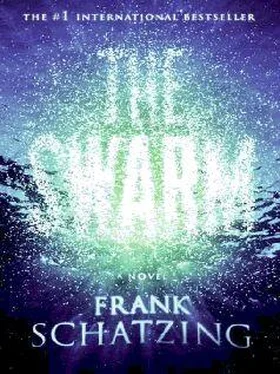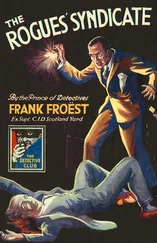Johanson surveyed her tall slim figure as he took off his coat. He liked Tina Lund. A few years ago they'd nearly got together, but instead they'd decided to stay friends. Now they just picked each other's brains and went out for the occasional meal. 'An old man like me needs his sleep,' he said. 'Coffee?'
'Sure.'
He popped into the adjoining office, where he found a fresh pot. His secretary was nowhere to be seen.
'Milk, no sugar,' Lund called.
'I know.' Johanson poured the coffee into two mugs, added a splash of milk to one, and returned to his office. 'I know all about you, remember?'
'You didn't get that far.'
'Heaven forbid! Now, take a seat. What brings you here?'
Lund picked up her mug, but remained standing. 'A worm, I think.'
Johanson raised his eyebrows and took a gulp of his coffee. 'What do you mean, you think ?
She picked up a small steel container from the windowsill and placed it in front of him on the desk. 'See for yourself.'
Johanson opened it. The container was half filled with water. Something long and hairy was writhing inside. He examined it carefully.
'Any idea what it is?' she asked.
He shrugged. 'Worms. Two big ones.'
'We'd worked that out, but what species?'
'Ah! So that's why you need a biologist. They're polychaetes – bristleworms.'
I'm familiar with polychaetes…' she hesitated 'but could you take a proper look and classify them?'
'Hmmm.' Johanson peered into the container. 'As I said, they're bristleworms. Nice ones too. The ocean floor is covered with creatures like them. No idea what species, though. What's the problem with them?'
'If only we knew.'
'What do you know?'
'We found them on the continental slope, seven hundred metres down.'
Johanson scratched his chin. They must be hungry, he thought. He was surprised they were still alive: most organisms didn't take kindly to being hauled up from the depths.
He glanced up. 'There's no harm in taking a look at them. I'll be in touch tomorrow.'
'Great' She paused. 'You've noticed something odd about them, haven't you? I can tell by the way you're looking at them.'
'Perhaps.'
'What is it?'
'I can't say for sure. Taxonomy isn't my specialty. Bristleworms come in all shapes and colours and I'm not familiar with them all, but these…'
Lund flashed him a smile. Why don't you look at them now? You could tell me your findings over lunch.'
'I do have a job to get on with, you know.'
'Well, you can't be too pushed at the moment – judging by the time you rolled up this morning.'
How irritating; she was right.
'OK.' He sighed. 'We'll meet at one in the cafeteria. Were you planning on a long-term friendship with them, or can I cut them up?'
'Do whatever it takes, Sigur. I'll see you later.'
She hurried out. Johanson watched her go. Perhaps the two of them could have made a go of it, he thought. But Tina Lund lived life at a sprint. She was much too hectic for someone like him.
He sorted his post and caught up on some phone calls. Then he picked up the container and carried it into the lab. There was no doubt that they were polychaetes, members of the Annelida phylum. Segmented worms, like the common earthworm. They weren't complex, as far as organisms went, but they fascinated zoologists: polychaetes were among the oldest known organisms. Fossil records showed that they'd survived, practically unchanged, since the Middle Cambrian era, more than 500 million years ago. A few species were found in fresh water or on marshy ground, but the seas and oceans teemed with them. They aerated the sediment and provided fish and crabs with a rich source of nutrition. Most people found them repellent, but Johanson saw them as the survivors of a lost world: he found them exceptionally beautiful.
He took a few moments to examine the pinkish bodies, with their tentacle-like growths and clumps of fine white bristle. Then he dripped magnesium chloride solution into the container to anaesthetise them. There were a number of ways to kill a worm, but the most common was to immerse them in alcohol, usually vodka or aquavit. For humans that would mean death by intoxication – not a bad way to go. But worms felt things differently and screwed themselves into a ball to die, unless you relaxed them first. The magnesium chloride slackened their muscles, so that you could do what you liked with them.
He decided to freeze one worm: it was always good to have a specimen in reserve, in case you decided to examine its DNA or do a stable isotope analysis. He fixed the other worm in alcohol, then laid it out for measuring. Nearly seventeen centimetres, he noted. Then he cut it open lengthways and gave a low whistle. 'Well, well, well,' he murmured.
The specimen had all the classic features of an annelid worm. Its proboscis was tucked within its body, ready to unfurl and seize its prey. It was tipped with chitinous jaws and rows of minuscule teeth. Over the years Johanson had examined plenty of polychaetes, inside and out, but those were the biggest jaws he'd ever seen. As he gazed at the worm he couldn't help wondering if it was new species. Few had the luck to discover a species, he thought. His name would be immortal…
He turned on his computer to consult the Intranet, then wandered through the maze of data. The outcome was baffling. In one sense the worm was there, but in another it wasn't.
By the time he was rushing through the glass-covered walkways towards the cafeteria, he was already a quarter of an hour late. He burst into the room, spotted Lund at a corner table and went over to her. She was sitting under a palm tree, and gave him a little wave.
'Sorry,' he said. 'Have you been here long?'
'Ages. I'm starving.'
'Let's have the shredded chicken stew,' said Johanson. 'It was good last week.'
Lund nodded: she knew she could trust his recommendation. She ordered Coke, while he had a glass of wine. When the waiter brought their drinks, she was shifting impatiently on her chair. 'Well?'
Johanson sipped his wine. 'Not bad. Fresh and full-bodied.'
Lund rolled her eyes.
'OK, OK.' Amused, he put down his glass, settled back and crossed his legs. Anyone who lay in wait for him on a Monday morning deserved to be kept in suspense, he thought. 'We'd already established that they're annelid worms, polychaetes. I'm hoping you don't need a full report because that would take weeks, if not months. For the moment I'd treat the two specimens as a mutation or a new species – or both, to be precise.'
'That doesn't sound precise.'
'Sorry, but that's the way it is. Where did you find them?'
Lund described the site. It was a considerable distance from the coast, on the continental slope, where the Norwegian shelf descended towards the deep ocean floor.
'Dare I ask what Statoil was doing down there?' Johanson asked.
'Looking at cod.'
'Cod? Now, that is good news – I thought they'd died out.'
'It's not funny, Sigur. You know how many obstacles have to be cleared before we can even think about drilling. We don't want to be accused of not doing our homework.'
'You mean you're building a platform? But oil yields are dropping.'
'That's not my problem,' Lund said tersely. 'What I'm worried about is whether we can build there in the first place. It's the furthest out to sea we've ever drilled. We've got to get on top of the technological challenges and prove that we're respecting the environment. Which is why we're trying to find out what's swimming around down there and how the site functions ecologically – so that people like you don't complain.'
Johanson nodded. Lund was contending with the fallout from the recent North Sea Conference, at which the Norwegian Ministry of Fisheries had castigated the oil industry for expelling millions of tonnes of contaminated water into the sea every day. It had lain undisturbed in sub-seabed petroleum reserves for millions of years but was now being pumped to the surface by the hundreds of offshore North Sea platforms that lined the Norwegian coast. The oil was separated from it by mechanical means, and the chemical-saturated water discharged back into the sea. No one had questioned the practice until, after decades, the Norwegian government had asked the Institute of Marine Research to undertake a study. The findings dealt a blow to the oil industry and environmentalists alike. Substances in the water were interfering with the reproductive cycle of cod. They worked like female hormones, causing the male fish to become infertile or even to change sex. Other species were affected too. The oil companies were ordered to stop dumping the water and had no choice but to look for an alternative.
Читать дальше












